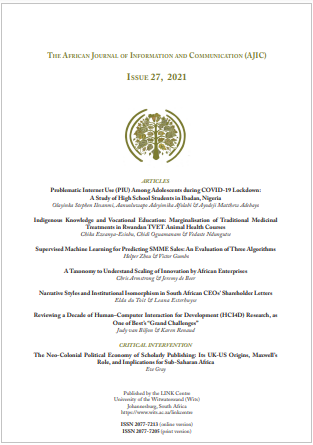Problematic Internet Use (PIU) Among Adolescents during COVID-19 Lockdown: A Study of High School Students in Ibadan, Nigeria
DOI:
https://doi.org/10.23962/10539/31373Keywords:
Problematic internet use (PIU), Internet addiction test (IAT), Adolescents, High school students, COVID-19, Lockdown, Ibadan, NigeriaAbstract
Problematic internet use (PIU) has generally been strongly associated with depression and attention deficit hyperactivity disorder, especially among adolescents, with resulting consequences for their health. This study explores the pattern of internet use, and the prevalence of PIU before and during the COVID-19 lockdown, as well as the causes, effects, and potential mitigation measures in respect of PIU during the lockdown, among high school students in Ibadan, Nigeria. A structured questionnaire, including a 20-question internet addiction test (IAT), was administered during the COVID-19 lockdown to 440 adolescents enrolled in high schools. Of these adolescents, 7.7% appeared from their responses to have had PIU before the COVID-19 lockdown period. However, 64.3% of respondents appeared from their responses to have had PIU during the COVID-19 lockdown period. The main reasons for the increased PIU were boredom, loneliness, idleness, pleasure gained from internet use, physical isolation, and the need for information and communication. The effects of PIU reported among the adolescents included reduced family intimacy, poor academic performance, loss of concentration, as well as internet abuse and risky sexual behaviour. To mitigate PIU among high school students, parental monitoring of adolescents, and their internet access and use, should be promoted. In addition, programmes should be organised by the media and academic institutions to keep adolescents engaged in productive tasks.
References
Aboujaoude, E. (2010). Problematic Internet use: An overview. World Psychiatry, 9(2), 85–90. https://doi.org/10.1002/j.2051-5545.2010.tb00278.x
Afolabi, A. A., & Ilesanmi, O. S. (2021). Dealing with vaccine hesitancy in Africa: The prospective COVID-19 vaccine context. The Pan African Medical Journal, 38(3). https://doi.org/10.11604/pamj.2021.38.3.27401
Ajayi, O. (2020, March 21). Covid-19: FG shuts Enugu, Port Harcourt and Kano Airports. Vanguard.
Brown, J. D. (2006). Emerging adults in a media-saturated world. In J. J. Arnett & J. L. Tanner (Eds.), Emerging adults in America: Coming of age in the 21st century (pp. 279–299). American Psychological Association. https://doi.org/10.1037/11381-012
Cakmak, F. H., & Gul, H. (2018). Factors associated with problematic internet use among children and adolescents with Attention Deficit Hyperactivity Disorder. Northern Clinics of Istanbul, 5(4), 302–313. https://doi.org/10.14744/nci.2017.92668
Ceyhan, A. A. (2008). Predictors of problematic Internet use on Turkish university students. Cyberpsychology & Behaviour, 11, 363–366. https://doi.org/10.1089/cpb.2007.0112
Donohue, J. M., & Miller, E. (2020). COVID-19 and school closures. JAMA, E1–E3. https://doi.org/10.1001/jama.2020.13092
Hoare, E., Millar, L., Fuller-Tyszkiewicz, M., Skouteris, H., Nichols, M., Malakellis, M., Swinburn, B., & Allender, S. (2016). Depressive symptomatology, weight status and obesogenic risk among Australian adolescents: A prospective cohort study. BMJ Open, 6(3), e010072. https://doi.org/10.1136/bmjopen-2015-010072
Ilesanmi, O. S., Afolabi, A. A., Akande, A., Raji, T., & Mohammed, A. (2021). Infection prevention and control during COVID-19 pandemic: Realities from healthcare workers in a northcentral state in Nigeria. Epidemiology and Infection, 149(e15), 1–9. https://doi.org/10.1017/S0950268821000017
Király, O., Potenza, M. N., Stein, D. J., King, D. L., Hodgins, D. C., Saunders, J. B., Griffiths, M. D., Gjoneska, B., Billieux, J., & Brand, M. (2020). Preventing problematic internet use during the COVID-19 pandemic: Consensus guidance. Comprehensive Psychiatry, 100. https://doi.org/10.1016/j.comppsych.2020.152180
Kormas, G., Critselis, E., Janikian, M., Kafetzis, D., & Tsitsika, A. (2011). Risk factors and psychosocial characteristics of potential problematic and problematic internet use among adolescents: a cross-sectional study. BMC Public Health, 11, 595. https://doi.org/10.1186/1471-2458-11-595
National Population Commission (NPC), & ICF (2019). Nigeria demographic and health survey 2018. https://dhsprogram.com/pubs/pdf/FR359/FR359.pdf
Nigeria Centre for Disease Control (NCDC). (2020, September 11). COVID-19 situation report as at 23rd August 2020. https://covid19.ncdc.gov.ng/
Oshodi, O. Y., Erinfolami, A. R., & Akinbode, A. A. (2012). Problematic internet usage among students in a medical school in Lagos, Nigeria. Nigerian Journal of Psychiatry, 10(1).
Park, M., Park, S., Jung, K., Kim, J. I., Cho, S. C., & Kim, B. (2018). Moderating effects of depressive symptoms on the relationship between problematic use of the Internet and sleep problems in Korean adolescents. BMC Psychiatry, 1–8. https://doi.org/10.1186/s12888-018-1865-x
Tahiroğlu, A. Y., Çelik, G., Uzel, M., Özcan, N., & Avci, A. (2008). Internet use among Turkish adolescents. Cyberpsychology, Behavior, and Social Networking, 11, 537–543. https://doi.org/10.1089/cpb.2007.0165
Üneri, Ö. Ş., & Tanıdır, C. (2011). Evaluation of internet addiction in a group of high school students: a cross-sectional study [in Turkish]. Dusunen Adam: The Journal of Psychiatry and Neurological Sciences, 24, 265–272. https://doi.org/10.5350/DAJPN2011240402
Volkin, S. (2020, May 11). The impact of the COVID-19 pandemic on adolescents. https://hub.jhu.edu/2020/05/11/covid-19-and-adolescents
World Health Organisation (WHO). (n.d.). Coronavirus. https://www.who.int/healthtopics/coronavirus#tab=tab_1
Worldometer. (n.d.). Coronavirus. https://www.worldometers.info/coronavirus/
Yang, S. C., & Tung, C. J. (2007). Comparison of internet addicts and non-addicts in Taiwanese high school. Computers in Human Behaviour, 23, 79–96.
Young, K. S., & Rogers, R. C. (2009). The relationship between depression and internet addiction. Cyberpsychology, Behavior, and Social Networking, 1, 25–28. https://doi.org/10.1089/cpb.1998.1.25
Downloads
Published
Issue
Section
License
Copyright (c) 2021 Olayinka Stephen Ilesanmi, Aanuoluwapo Adeyimika Afolabi, Ayodeji Matthew Adebayo

This work is licensed under a Creative Commons Attribution 4.0 International License.
How to Cite
- Abstract 779
- PDF 396


.png)